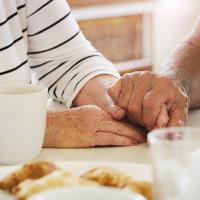Will drinking alcohol increase my risk of cancer? It’s a common question while also being a source of considerable confusion. A National Cancer Institute survey found only 34% of US adults believe alcohol can cause cancer, while 27% say no and 39% don't know;1 meanwhile, two-thirds agree it seems like everything causes cancer.2 Perceptions like this are not helpful when it comes to providing clear guidance around risk.3 In this post we take a closer look at the evidence: what is known about alcohol and cancer risk, alongside other ways that alcohol can affect the bladder.
Click a link to jump to a specific section of the article, or continue reading below.
- Does alcohol cause cancer?
- Is alcohol a carcinogen?
- How can alcohol cause cancer?
- Does alcohol cause cancer?
- What cancers does alcohol cause?
- How much does alcohol increase cancer risk?
- Does moderate drinking cause cancer?
- Does the type of alcohol matter?
- Will it increase the risk if I drink and smoke?
- Alcohol and bladder cancer
- How does alcohol affect the bladder?
- Does alcohol irritate the bladder?
- Can alcohol cause a bladder infection?
- Alcohol and blood in the urine
Does alcohol cause cancer?
Globally, it’s estimated that drinking alcohol caused over 740,000 new cases of cancer in 2020, representing 4.1% – about 1 in 25 – of all new cancer cases.4 While this shows the majority of cancers are not caused by alcohol, some types of cancer are strongly linked. The diagram on this page from the National Cancer Institute highlights parts of the body with a known risk of alcohol-related cancer, which we will look at below.
Is alcohol a carcinogen?
Though a link between drinking alcohol and cancer risk does not prove that alcohol causes cancer, the link between alcohol and certain cancers remains even after taking into account other risk factors, such as smoking. Furthermore, the WHO’s International Agency for Research on Cancer (IARC) classifies alcoholic drinks as a known (Group 1) human carcinogen, based on sufficient evidence of carcinogenicity from studies in humans.5
How can alcohol cause cancer?
- Alcoholic drinks contain ethanol (ethyl alcohol), which is converted in the body to acetaldehyde and then to acetate
- Acetaldehyde is a known carcinogen that can damage DNA, causing mutations that can eventually lead to tumor development. Acetaldehyde is also present in some alcoholic drinks.
- Other mechanisms may include oxidative stress (where reactive oxygen species damage DNA), impaired nutrient absorption, and increased estrogen levels (a risk factor for breast cancer)
- Alcoholic drinks may also contain contaminants from the raw materials, fermentation and the maturation process. These include known or suspected carcinogens.
What cancers does alcohol cause?
There is convincing evidence that drinking alcohol causes at least seven types of cancer, with the strongest link seen for tissues directly exposed to alcohol, plus the liver According to the IARC, “Alcohol consumption causes cancers of the oral cavity, pharynx, larynx, oesophagus, colorectum, liver (hepatocellular carcinoma) and female breast.”5 Heavy drinking increases the risk of stomach cancer and possibly pancreatic cancer.6 Alcohol may also increase the risk of lung cancer and melanoma, but has been linked to a lower risk of kidney cancer and lymphoma.6,7
Some interesting facts about alcohol-related cancers in 20204,8:
- The pattern of alcohol-induced cancers varies around the world. Globally, the cancer most often linked to alcohol is esophageal cancer (32% of cases).
- About three-quarters of alcohol-induced cancers occur in men, but women are more at risk from light drinking.
- In North American men, the top alcohol-related cancers are the oral cavity (36% of cases), pharynx (32%), liver (28%), larynx (22%), colon/rectum (15%), and esophagus (14%).
How much does alcohol increase cancer risk?
Mouth, throat, esophageal, colorectal and breast cancers all show a clear dose relationship between the level of alcohol consumption and increased risk. When data from 572 studies were analyzed, the risk for heavy drinkers relative to non-drinkers or occasional drinkers was about five times higher for oral/pharyngeal and esophageal cancers, and more than doubled for laryngeal, liver and gallbladder cancers.7 (For this analysis, heavy drinking was defined as more than 50 g of alcohol per day – equivalent to just over 3.5 standard US drinks.)
Another factor to consider is how common the cancer is – a small increase in the risk of a common cancer such as breast or colorectal cancer will affect more people than a large increase in the risk of a rare cancer.

Does moderate drinking cause cancer?
Drinking any alcohol is associated with a modest increase in the risk of mouth, throat, esophageal and breast cancers, with a further increase in risk for moderate drinking.6,7 It’s important to note that drinking guidelines vary between countries. In the US, one standard drink contains 0.6 ounces or 14 g of alcohol, and moderate drinking is considered to be up to two drinks per day for men and one for women.9 Two or more drinks per day (30 g of alcohol) increases the risk of colorectal cancer.6 On the other hand, up to two drinks per day probably reduces the risk of kidney cancer.6
Moderate drinking is more risky for women than men. In North America, alcohol consumption of less than 20 g per day accounted for an estimated 34% of new alcohol-related cancer cases among women in 2020, but only 6% of those in men.4,8 To calculate these estimates, IARC researchers used World Cancer Research Fund data on the alcohol-related increase in cancer risk,6 together with information held by the WHO on cancer cases and patterns of alcohol consumption.
Does the type of alcohol matter?
All types of alcoholic drinks can cause cancer, which is related to the amount of ethanol (alcohol) consumed. Although drinking red wine may have cardiovascular benefits, from a cancer prevention perspective it is a myth that red wine is healthier. Some studies have found that beer and spirits, but not wine, significantly increase the risk of certain mouth and throat cancers, but this may be because wine drinkers have healthier lifestyles. Expert opinion is that different types of alcohol generally have similar effects on cancer risk.
Will it increase the risk if I drink and smoke?
People who both smoke and drink alcohol have a further increase in the risk of several cancers, especially mouth and throat cancers, where the combined risk is greater than additive. One theory is that alcohol may make it easier for tobacco-related carcinogens to enter cells. Smoking may also mask the true effect of alcohol on cancer risk. For example, smoking is a strong risk factor for bladder cancer, which can complicate the interpretation of study results if heavy drinkers are also smokers.
Alcohol and bladder cancer
The good news is that, for most people, moderate alcohol consumption is unlikely to affect the risk of developing bladder cancer. The IARC concluded in 2012 that “Overall, the studies on cancer of the urinary bladder suggest no association with consumption of alcoholic beverages”.5 An analysis of 19 studies also found no association, even for heavy drinkers.7 Still, there have been inconsistent findings. Currently, the World Cancer Research Fund considers that there is not enough high-quality evidence to be sure whether alcohol increases the risk of bladder cancer.
Given the clear link between alcohol and other cancer types, moderation is recommended. If you’re experiencing symptoms of bladder cancer, and are concerned, speak to your doctor as soon as possible.
How does alcohol affect the bladder?
Drinking alcohol increases urine production and may cause or worsen bladder symptoms like urgent or frequent need to urinate, or having to get up repeatedly at night (clinically, these are described as lower urinary tract symptoms, or LUTS). However, the evidence from clinical studies suggests that men who are light drinkers have less severe LUTS than either non-drinkers or heavy drinkers.10
Does alcohol irritate the bladder?
Alcohol is widely recognized as a bladder irritant, although this is largely anecdotal. Reducing or avoiding alcohol is often advised for people with LUTS or overactive bladder, to see if symptoms improve. Alcohol is a commonly reported trigger for worsening of bladder pain, frequency or urgency in women with interstitial cystitis (a chronic painful bladder syndrome).11
Can you get a UTI from drinking alcohol?
Alcohol does not cause urinary tract infections (UTIs), which result from bacteria entering the urinary tract and multiplying in the bladder. However, alcohol can affect immune function,12 and alcohol use or abuse has been linked to an increased risk of UTI after surgery.13,14 Avoiding alcohol is recommended if you have a UTI, as it may aggravate symptoms such as urgent and frequent need to urinate.
Alcohol and blood in the urine
If you see blood in your urine after drinking – or at any other time – always tell your doctor. Though blood in the urine (hematuria) is often a result of infection, it’s important to rule out less common but more serious causes such as bladder cancer, given that blood in urine is the most frequent symptom and often the first sign of the disease.
Cxbladder can help rule out bladder cancer
If you’re worried about blood in urine, speak to your doctor and ask if Cxbladder is right for you.
Cxbladder is a non-invasive genomic urine test optimized for the rule out of urothelial bladder cancer, the most common form of the disease. The test analyzes five biomarker genes to quickly and accurately rule out the disease, reducing the need for further invasive procedures.
Learn more about Cxbladder Contact us for more information
References
- Kiviniemi MT, et al. Limitations in American adults' awareness of and beliefs about alcohol as a risk factor for cancer. Prev Med Rep. 2021;23:101433. doi:10.1016/j.pmedr.2021.101433. [PubMed abstract]
- National Cancer Institute. Health Information National Trends Survey®. HINTS Response: It seems like everything causes cancer. Data from HINTS 5 Cycle 3 (2019). Available at https://hints.cancer.gov.
- Stewart B. Everything does not give you cancer, so avoid the things that might. Cancer Council Australia blog, 4 February 2014.
- Rumgay H, et al. Global burden of cancer in 2020 attributable to alcohol consumption: a population-based study. Lancet Oncol. 2021;22:1071-1080. doi:10.1016/S1470-2045(21)00279-5. [PubMed abstract]
- International Agency for Research on Cancer, 2012. IARC monographs on the evaluation of carcinogenic risks to humans; volume 100E. Personal habits and indoor combustion: Consumption of Alcoholic Beverages.
- World Cancer Research Fund and American Institute for Cancer Research. Continuous Update Project: Alcoholic drinks. Accessed October 2021.
- Bagnardi V, et al. Alcohol consumption and site-specific cancer risk: a comprehensive dose-response meta-analysis. Br J Cancer. 2015;112:580-93. doi:10.1038/bjc.2014.579. [PubMed abstract]
- Rumgay H, et al. (2021). Cancers attributable to alcohol. Lyon, France: International Agency for Research on Cancer. [Accessed October 2021].
- Centers for Disease Control and Prevention (CDC). Alcohol Use and Your Health.
- Bradley CS, et al. Evidence of the impact of diet, fluid intake, caffeine, alcohol and tobacco on lower urinary tract symptoms: a systematic review. J Urol. 2017;198:1010-1020. doi:10.1016/j.juro.2017.04.097. [PubMed abstract]
- Shorter B, et al. Effect of comestibles on symptoms of interstitial cystitis. J Urol. 2007;178:145-52. doi:10.1016/j.juro.2007.03.020. [PubMed abstract]
- Szabo G, Saha B. Alcohol's effect on host defense. Alcohol Res. 2015;37:159-70. [PubMed abstract].
- de Wit M, et al. Alcohol use disorders and hospital-acquired infections in women undergoing cesarean delivery. Obstet Gynecol. 2013;122:72-78. doi: 10.1097/AOG.0b013e318297be8d. [PubMed abstract].
- Lee D, et al. Risk factors for postoperative urinary tract infections following anterior lumbar interbody fusion. Int J Spine Surg. 2020;14:493-501. doi: 10.14444/7065. [PubMed abstract].
Additional sources
Alcohol and cancer
- LoConte NK, et al. Alcohol and Cancer: A Statement of the American Society of Clinical Oncology. J Clin Oncol. 2018;36:83-93. doi:10.1200/JCO.2017.76.1155. [PubMed abstract].
- McCarthy A, Cancer Research UK. How does alcohol cause cancer?
- National Cancer Institute. Alcohol and Cancer Risk.
- World Cancer Research Fund/American Institute for Cancer Research. Continuous Update Project Expert Report 2018: Alcoholic drinks and the risk of cancer. Available at dietandcancerreport.org.
Alcohol and the bladder
- European Association of Urology. Guidelines for Non-neurogenic Female LUTS and Non-neurogenic Male LUTS.
- Interstitial Cystitis Association. Snapshot of research on IC and diet. Revised April 6, 2016.
- Mayo Clinic. Bladder control: Lifestyle strategies ease problems (August 4, 2020).
- Mayo Clinic. Urinary tract infection (UTI): Diagnosis and treatment.
- Urology Care Foundation of the American Urological Association. Overactive Bladder (OAB).
Alcohol consumption guidelines
- International Alliance for Responsible Drinking (IARD), 2019. Drinking guidelines: General population.








